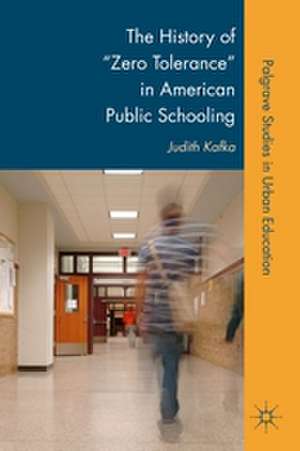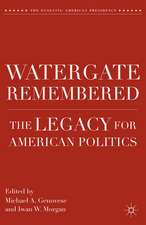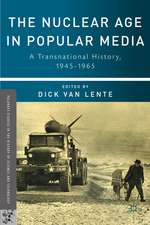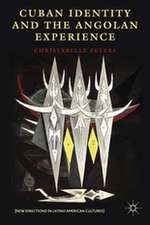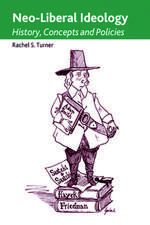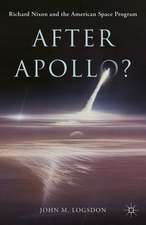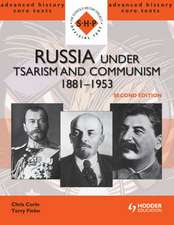The History of "Zero Tolerance" in American Public Schooling: Palgrave Studies in Urban Education
Autor J. Kafkaen Limba Engleză Hardback – 16 noi 2011
| Toate formatele și edițiile | Preț | Express |
|---|---|---|
| Paperback (2) | 289.78 lei 3-5 săpt. | |
| Palgrave Macmillan US – 16 noi 2011 | 289.78 lei 3-5 săpt. | |
| Palgrave Macmillan US – 23 oct 2013 | 315.51 lei 3-5 săpt. | |
| Hardback (1) | 296.08 lei 3-5 săpt. | |
| Palgrave Macmillan US – 16 noi 2011 | 296.08 lei 3-5 săpt. |
Preț: 296.08 lei
Nou
Puncte Express: 444
Preț estimativ în valută:
56.66€ • 59.03$ • 47.11£
56.66€ • 59.03$ • 47.11£
Carte disponibilă
Livrare economică 20 ianuarie-03 februarie 25
Preluare comenzi: 021 569.72.76
Specificații
ISBN-13: 9780230603684
ISBN-10: 0230603688
Pagini: 181
Ilustrații: XIII, 181 p.
Dimensiuni: 140 x 216 x 15 mm
Greutate: 0.36 kg
Ediția:2011
Editura: Palgrave Macmillan US
Colecția Palgrave Macmillan
Seria Palgrave Studies in Urban Education
Locul publicării:New York, United States
ISBN-10: 0230603688
Pagini: 181
Ilustrații: XIII, 181 p.
Dimensiuni: 140 x 216 x 15 mm
Greutate: 0.36 kg
Ediția:2011
Editura: Palgrave Macmillan US
Colecția Palgrave Macmillan
Seria Palgrave Studies in Urban Education
Locul publicării:New York, United States
Cuprins
Zero Tolerance and the Case of Los Angeles * Discipline before Zero Tolerance, 1800-1950 * Bureaucratizing Discipline in the Blackboard Jungle * Struggle for Control in the 1960s * The Death of in Loco Parentis * Reclaiming School Discipline
Recenzii
"Kafka writes an admirable history of zero tolerance policies and practices in urban education . . . While doing so, she exposes controversies among academic and therapeutic concerns, overweening bureaucratic entanglements, the changing nature of teacher-student and teacher-family relationships, and the trend toward discipline as punitive rather than educative. . . The author's precise archival research highlights urban patterns that would become public and glaring decades later . . . Highly recommended." - Choice
"The History of Zero Tolerance in American Public Schooling is an important scholarly contribution to the history of American education.It will undoubtedly serve as a guidebook for scholars studying school discipline for many years to come.Using Los Angeles as a case study to anchor her work, Kafka demonstrates how an often irrational fear of violence has served as an impetus for highly punitive discipline policies in schools.Supported by extensive historical research, this book should also help policymakers and educators to question some of the assumptions about the nature of violence in school that have led to the draconian policies we now have in many places.It should also prompt the reasonable among us to ask whether the remedy (zero tolerance) may be worse than the ailment it was designed to address." - Pedro A. Noguera, Peter L. Agnew Professor of Education, Steinhardt School of Culture, Education and Development, Executive Director, MetropolitanCenter for Urban Education, New York University
"Judith Kafka has produced our first sophisticated, archives-based account of modern school discipline in the United States. Even more, Kafka provides the first truly historical explanation for the rise of so-called 'zero-tolerance' policies in the schools. No matter what you think of these policies - and Kafka is deeply critical of them - you will have to read this book to understand them. I hope it garners all of the attention that it so richly deserves." - Jonathan Zimmerman, Professor of Education and History, New York University
"Judith Kafka has given us a remarkable account of shifting discipline policies in American schools, with particular attention to the nation's second largest city, long neglected by historians of education. It represents a significant contribution to our understanding of changes in urban education across the twentieth century, especially during the crucial decades following 1950, precursors to the current crisis in big city schools." - John L. Rury, Professor of Education and (by courtesy) History, University of Kansas
"The History of Zero Tolerance in American Public Schooling is an important scholarly contribution to the history of American education.It will undoubtedly serve as a guidebook for scholars studying school discipline for many years to come.Using Los Angeles as a case study to anchor her work, Kafka demonstrates how an often irrational fear of violence has served as an impetus for highly punitive discipline policies in schools.Supported by extensive historical research, this book should also help policymakers and educators to question some of the assumptions about the nature of violence in school that have led to the draconian policies we now have in many places.It should also prompt the reasonable among us to ask whether the remedy (zero tolerance) may be worse than the ailment it was designed to address." - Pedro A. Noguera, Peter L. Agnew Professor of Education, Steinhardt School of Culture, Education and Development, Executive Director, MetropolitanCenter for Urban Education, New York University
"Judith Kafka has produced our first sophisticated, archives-based account of modern school discipline in the United States. Even more, Kafka provides the first truly historical explanation for the rise of so-called 'zero-tolerance' policies in the schools. No matter what you think of these policies - and Kafka is deeply critical of them - you will have to read this book to understand them. I hope it garners all of the attention that it so richly deserves." - Jonathan Zimmerman, Professor of Education and History, New York University
"Judith Kafka has given us a remarkable account of shifting discipline policies in American schools, with particular attention to the nation's second largest city, long neglected by historians of education. It represents a significant contribution to our understanding of changes in urban education across the twentieth century, especially during the crucial decades following 1950, precursors to the current crisis in big city schools." - John L. Rury, Professor of Education and (by courtesy) History, University of Kansas
Notă biografică
Judith Kafka is Associate Professor of Educational Policy and History of Education at School of Public Affairs, Baruch College, City University of New York, USA.
